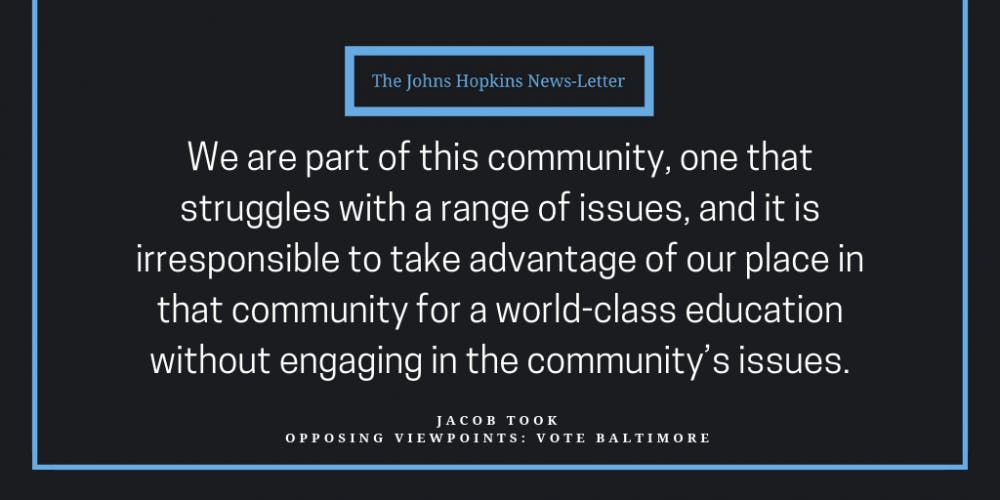The News-Letter is proud to introduce a new series: Opposing Viewpoints. This space is for students with diverse perspectives to answer pertinent questions in conversation with each other.
Baltimore is a college town, with nine universities in the city limits attracting around 55,000 students. Many of these students, particularly those at Hopkins, are reluctant to make a home in the city. They are wary of exploring its neighborhoods, rarely patronize the city’s cafes, steer clear of getting involved in local political issues and are generally comfortable living in the Hopkins bubble for four years.
What inescapably connects us to the residents of the city around us? Well, you have an address in Baltimore, right? That means you share representatives on the local and federal level with your native Baltimorean neighbors. And if you spend a majority of your time in Baltimore for school, then you’re part of this community.
Think about the money you give to local businesses, or how much you’ve spent on Ubers in the city. Then think about the 50,000 Baltimoreans Hopkins employs between the University and the hospital. Your tuition pays those salaries.
The University is also complicit in some of the city’s economic struggle. Examples are abundant in your own backyard. Gentrification along St. Paul has directly contributed to economic decline along North Avenue, which 10 years ago was a popular student hangout.
Growing poverty is a trend that often dominates Hopkins students’ perception of Baltimore. And yet, as members of this community, we have the power to address these problems. By registering to vote in Maryland, we’d have the power to choose our representatives and hold them accountable for improving the city that we share.
Blame whomever you want for poverty and violence in Baltimore, but I’ll tell you who is doing a shitty job of addressing those issues: our governor Larry Hogan, and he is campaigning for reelection this year.
People often argue that Maryland is a solid blue state, and that voting here therefore is not worth it. Of our eight federal representatives, seven are Democrats, as are both of our senators. But our city council members and congressional representative -- currently Elijah Cummings -- can only do so much to fight for Baltimore against the formidable Hogan administration.
Where to start with Hogan? It is worth noting that he’s got around a 70 percent approval rating, one of highest of any governor in the country. He is widely seen as a moderate, having criticized U.S. President Donald Trump on a number of issues. In a poll conducted by The Baltimore Sun and the University of Baltimore, 60 percent of likely Democratic voters approve of the Hogan administration.
Hogan’s popularity shows that Maryland is a battleground state. He proves that the state’s blue core is not as firm as many Democrats would like to think. He proves that turning a majority of Maryland voters red is not unrealistic.
And yet his critics have said that he is at war with Baltimore. Look at the Red Line, a transportation project over a decade in the making that Hogan effectively cancelled in 2015 when he announced that his administration would not provide promised state funds. Many hoped that the Red Line, a subway connecting West and East Baltimore, would bring badly-needed economic growth to impoverished communities in Baltimore’s suburbs.
The next year, when Maryland’s state revenue fell short of Hogan’s estimate, his administration announced that it would withhold $80 million in spending for violence reduction programs, school renovations and other programs. So to all the Hopkins students who are wary of exploring Baltimore because of its high levels of crime and gun violence, you can thank Governor Hogan for that.
Let me be clear: I’m not writing this to encourage you to go and vote against Hogan. I am writing this because we as Hopkins students are residents of Baltimore. We are part of this community, one that struggles with a range of issues, and it is irresponsible to take advantage of our place in that community for a world-class education without engaging in the community’s issues.
It is our duty as Hopkins students to be aware of our place in the city. Whatever party you might agree with, whatever solutions you think are best for Baltimore, you have the power to elect the officials that represent this community. As Hopkins students, Baltimore residents and Americans, it is your responsibility to vote.
Jacob Took is a junior from Dallas, Texas majoring in Writing Seminars, English and Russian. He is a Managing Editor.

















